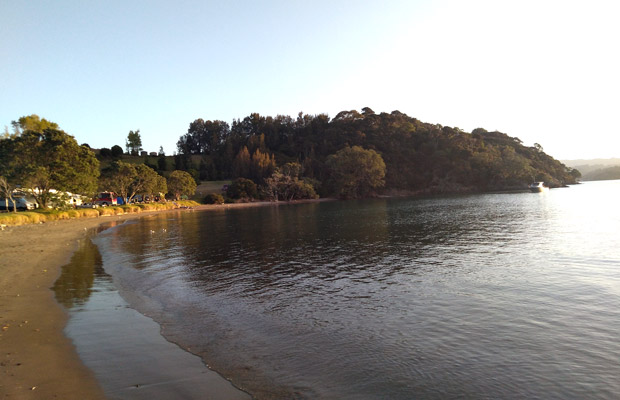
Polly Greeks’ Blog: Water wars
Polly considers the controversial use of the local water supply as the Far North experiences its driest summer yet.
We’d forgotten the water container, the tent-peg hammer, dining bowls, our garden-produce plus eight-year-old Vita’s shoes. In a way it was a relief – determining what we’d failed to bring on our camping trip.
Every year there is something. Other times we’ve forgotten the kettle, pillows, fold-up chairs, a sleeping bag. This is nothing, according to a friend who claims irrevocable trauma from the time his parents forgot to pack him.
He remembers sitting forlornly on a step, snivelling for hours until his absence was registered.
When first hearing this story, pre-children, I marvelled at his parent’s carelessness. Post-children, I wonder if it was a deliberate oversight. There are days when juveniles definitely make it kind-of tempting.
We had a new tent. According to the brochure, it featured self-erecting poles and took just 30-seconds to spring up. It was lies, of course.
“Is the tent up yet?” Vita asked at five-minute intervals as James and I studied the flattened heap of canvas with its numerous flaps and zip-on extensions. Did our daughter lack eyes?
What the tent brochure should really have boasted was its ego-reducing qualities. By the time our tent was finally up, the friends we’d come with were all splashing merrily in the silken green sea.
As James and I critically surveyed our canvas home, the self-erecting poles suddenly buckled at the hinges and sunk inwards, pulling down the roof and our spirits.
Because nothing made the tent stay permanently upright, we resigned ourselves to our new sagging home, sandwiched, as it was, between taut erections. It was mildly humiliating. Friends nicknamed it ‘the cave’.

Luckily it didn’t rain but our thankfulness was very selfish. Northland has never been drier. Back in January, meteorologists officially declared our drought as ‘severe’. Some people in the campground were there because they had no water left at home.
“We’re water refugees,” a woman told me.
Numerous towns were announcing water emergencies. Taps had run dry. Apparently people were queuing on street corners to get drinking water from tankers.
Every day the sky was gloriously, cruelly blue. It was so hot, record highs were announced. Camping on the edge of the ocean, we flopped into the water like lazy seals. When we went for bush walks, the shadowed air was so blissfully cool and green it felt as if we were dry-swimming along the trails but young plants wilted further as each day passed.
Some were obviously not going to make it. The forest, like ours at home, felt different than usual; in lockdown, conserving energy as it endured its terrible thirst.
For a long time the UN said the world’s next big wars will be fought over water. In the Far North town of Kaitaia, locals are growing increasingly angry as their inferior water supply dries up while the avocado industry sucks long and hard on a nearby pristine aquifer.
Shouldn’t people have first rights to water, they ask?
That question is being repeated throughout New Zealand, including in the Bay of Plenty where local iwi, Ngati Awa and action group Save Our Wai are heading to the High Court to stop a mega water bottling plant from being developed. If it goes ahead, 3.7-million single-use plastic bottles of water will be produced every day, mostly exported to China.
The foreign-owned factory will be the Southern Hemisphere’s largest water-bottling plant. Ironically, the aquifer beneath Otakiri was officially labelled ‘over-allocated’ before the Chinese company applied for resource consent. There have been dark mutterings of Free Trade Agreements forcing our Government to sell our water to foreign corporations despite times of increasing droughts.
In 2019, bottled water exports skyrocketed 270 per cent, with 118-million litres sent overseas, mostly to China. That water costs less than a cent per cubic metre, to the companies that on-sell it for private gain.
Meanwhile, the average Kiwi household pays around $1.50 for the same amount to be piped to their home. New Zealanders pay another price for the exported water as well; in the form of pollution created by the plastic bottling plants.
As cracks in the parched land gape slowly open, people are cottoning on that water isn’t an infinite, disposable resource. They’re realising the Government’s allocation of water on a first-in, first-served basis could see corporate needs met before their own. It’s deeply concerning when water is so unequivocally life.
It’s time for firm dialogue regarding who gets to use this country’s water and for what purposes. We owe it to generations downstream to ensure this precious substance flows abundantly and pristinely through their lives as well as ours.
No trade agreement is worth more than a population’s right to its own fresh water. Contented people lean towards apathy. Maybe the current water-famine is the metaphorical slap needed to get the public to their feet and vocalising for their rights. Do droughts have a silver lining?
We returned from holiday happy but anxious to assess our own water supplies. Our forest streams have never been lower. Now that the semi-collapsed tent’s packed away, we’re visualising volumes of gentle rain soaking the longing land.
MORE HERE:

